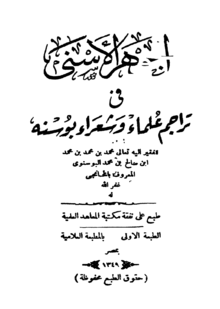Mehmed Handžić
He withdrew his support several months later and initiated the adoption of the Resolution of Sarajevo Muslims condemning the war crimes committed by the Independent State of Croatia.Handžić later became the chairman of the Council of National Salvation, which was created to organize defense and aid for Muslims of Bosnia.The Society of Gajret awarded him a scholarship towards medical studies for finishing Sharia Grammar School as the best student of his year.Handžić later participated in several meetings of major Bosnian cultural and religious organizations which led to the creation of the Movement for the Autonomy of Bosnia and Herzegovina[b] on 30 December 1939.[15] This included Handžić, who together with Kasim Dobrača, pledged allegiance to Poglavnik Ante Pavelić in May 1941 on the behalf of El-Hidaje.[16] However, this support was withdrawn on 28 August, when during an El-Hidaje assembly Handžić initiated the adoption of a resolution condemning Ustaše war crimes and the expulsion of Serbs, Jews, Romani and other people from Bosnia and Herzegovina.[21] During the same month, Handžić welcomed the Grand Mufti of Jerusalem, Amin al-Husseini at a banquet in the Sarajevo city hall.[14] Handžić strongly opposed the westernization of Bosnia, calling it "materialistic", and condemned pre-marital sex and consumption of alcohol.[28] Mehmed Handžić died during a routine medical operation in Koševo Hospital on 29 July 1944, at the young age of 37.[1] It has been alleged that the death was a result of an assassination by the Partisans; historian Marko Attila Hoare describes the theory as "not impossible".[1] Handžić's bibliography amounted to 300 books and numerous articles, treatises, essays, brochures and textbooks both on Bosnian and Arabic.
SarajevoAustria-HungaryIndependent State of CroatiaBosniaAlma materAl-Azhar UniversityBosnianIslamic scholartheologianpoliticianResolution of Sarajevo Muslimsprimarysecondary educationGazi Husrev-beg madrasaeditor-in-chief1938 Yugoslav parliamentary electionAxis powersinvadedwar crimes committed by the Independent State of CroatiaKoševoBosniakprimary educationkuttabSociety of GajretHadithIslamicArabicMuslim BrotherhoodYoung MuslimsIslamic lawmadrasatafsirkhanqahEnglishGazi Husrev-beg Librarylibrary catalogmanuscriptsmüderrisaʼimmahQur'anic commentariesCroatian Peasant Party1938 parliamentary electionUstašePoglavnikAnte PavelićresolutionUstaše war crimesRomaniChetniksUstaša regime of CroatiaKingdom of YugoslaviaMuslim SS DivisionGrand Mufti of JerusalemAmin al-HusseiniSarajevo city hallYugoslav PartisanssecularisationWorld War Iwesternizationmaterialisticanti-Muslimmassacres of Muslims in Rumelianationalismpan-IslamicMarko Attila HoareUniversity of Sarajevo
